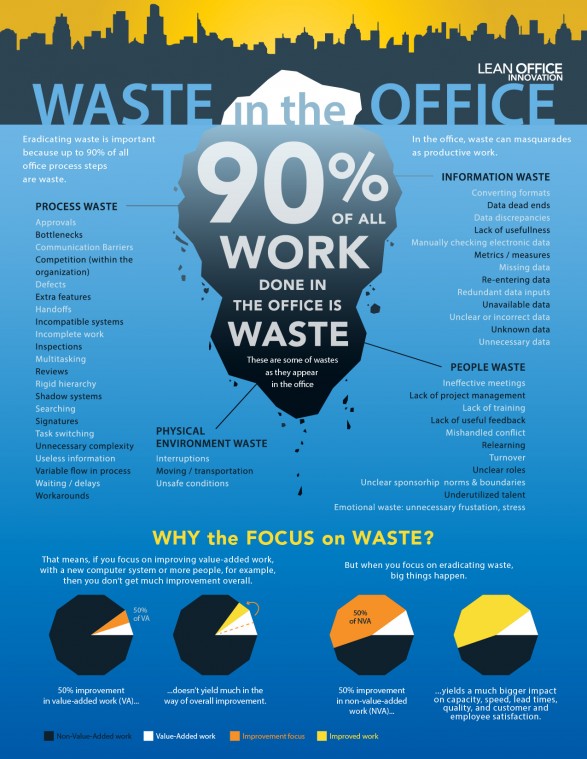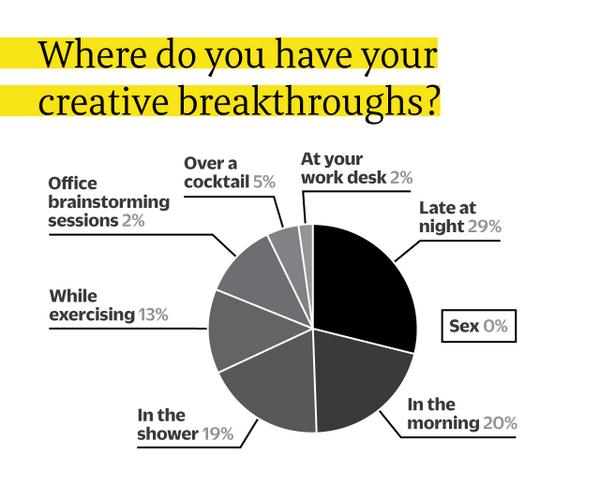“We literally followed people around all day and timed every event [that happened in the office], to the second.
That meant telephone calls, working on documents, typing e-mails, or interacting with someone.
What we found is that the average amount of time that people spent on any single event before being interrupted
was about three minutes.” – Gloria Mark, Professor in the Department of Informatics at the University of California
If you are working in an office today you will be interrupted – or you will interrupt yourself – every 3 minutes.
And what’s worse is it will take many of you up to 23 minutes to recover from that distraction.
If your boss lets you – go home. It’s the most productive decision you’ll make this year.
Here are four reasons why the office should have died by now:
- UK workers spend a year of their lives in meetings. If you work in the public sector it’s even worse – with nearly 2 years waste clocked up for every worker.
- You spend another year of your life commuting to and from work. At a total cost of about £50,000.
- You spend about 60% of your time on email. That’s about 4 years of your life.
- The office doesn’t have great long term prospects. Only 14% of UK workers want to work in a traditional office environment in the future.
And that’s before we go near writing reports. Around 90% never get cited anywhere and 50% of them are only read by the authors and commissioners.
So that’s 7 years off your life and and financial costs of at least £50K.
Only long term smoking can compare to the corrosive effects of the office.
But it gets worse.
You’re highly unlikely to ever have a single creative idea at work as detailed in the graph below:
Most people simply don’t have the time to be creative at work. They are too busy shovelling email and being bored in meetings.
Personally speaking my best ideas come not only when I’m away from the office , but when I’m as far away from it as possible.
The initial outline of what will become our online customer portal was done on a beach in Egypt. The first Power Players was developed and written in a bar in Jamaica. The concept of the Bromford Lab was initially sketched out waiting for a boat in Bali.
Bromford get the best value of out of me when I’m nowhere near them. And your employer probably does too.
So why do we all turn up at the office?
Well – there’s a wonderful scene in the original Dawn of The Dead where two characters observe the mass of zombies circulating an abandoned shopping mall.
“What are they doing? Why do they come here?” asks one.
The other replies “Some kind of instinct. Memory of what they used to do. This was an important place in their lives.”
And it’s this – a memory of what we used to do – that explains why we are locked into a pattern of coming to a place to sit at a screen and do emails.
That – together with a failure by organisations to trust in people and take advantage of social technology.
One of the major benefits we’ve found of launching the Bromford Lab is we are encouraged to throw off the shackles. We haven’t created new rules for meetings – we’ve eradicated the need for them altogether. We’ve eliminated reports by updating blogs and social sites on a regular basis. We are killing email by using more collaborative forums like Basecamp, Trello, Whatsapp and even Snapchat.
I find it amusing that the question most often asked of the digital evangelists is “how do you find time to use social media?”
The people I know who are the most social are the people who (coincidentally?) call less meetings, send less email and demand less reports.
Think of the leaders who are not regular social users, who scoff at the idea of digital leadership, and I think you’ll be close to identifying the problem.
But social leadership is more than being on LinkedIn and tweeting when you go to a conference. It’s about considering the strategic use of social technologies and the broader change to your culture.
- It’s about asking yourself if you started again in 2014 whether you’d have that meeting, require that email or need that report.
- It’s about re-evaluating your business and the way you operate in a world that is permanently connected.
- It’s about asking yourself whether you need to physically see people in front of you to trust they are doing a good job.
- It’s about designing out 7 years worth of waste.
The death of the traditional office and all the trimmings can’t come too soon.
The future of work is less about a physical place and more about social business: the value you bring to your network, the trust you inspire in people and the way you share knowledge to make things happen.
Let’s bring it on.


Leave a reply to mgursky Cancel reply